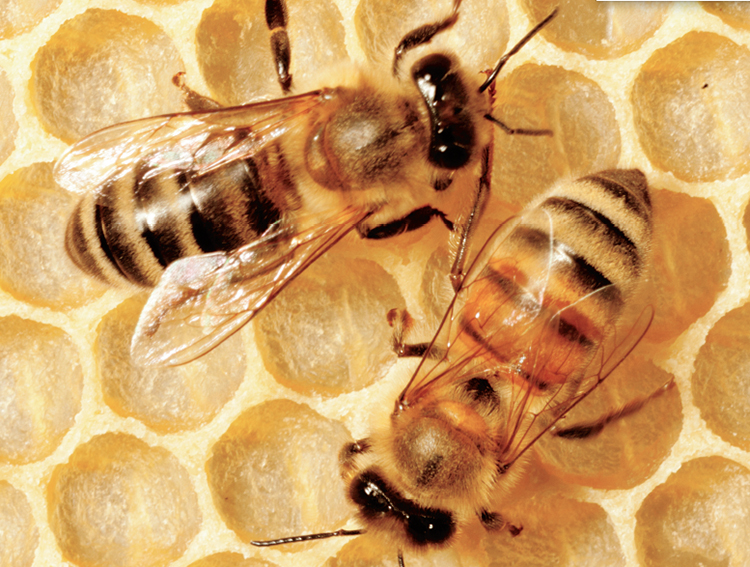Home > Arkansas > Arkansas Crops & Livestock > Arkansas Honeybees Work Hard
Arkansas Honeybees Work Hard

Honeybees may not be the first thing that comes to mind when you think of agriculture, but they are a vital part of our nation’s food chain. In Arkansas, there are 1,981 registered beekeepers and about 40,000 registered colonies of bees, and their job is to pollinate not only flowering plants, but also agricultural commodities such as beans, tomatoes, onions and carrots.
“Farmers and beekeepers in Arkansas tend to have good relationships,” says Jon Zawislak, an apiculture instructor at the University of Arkansas at Little Rock. “Bees add an estimated $18 billion to $20 billion to the national agricultural economy each year, by improving the quality and quantity of crop yields. Beekeepers depend on farm crops to help support their bee colonies, and farmers understand that bees benefit their cropsas well.”
Most of Arkansas’s beekeepers are hobbyists who manage fewer than 10 colonies, while others keep a few hundred hives of bees as a side business. A handful of commercial beekeepers do it full time.
“Beekeeping is a popular hobby in both rural and urban areas,” Zawislak says. “There was a sharp increase a few years ago, when the media began reporting alarming declines of bees and other pollinators. Beekeeping has been growing steadily, as more people are growing urban gardens and raising backyard poultry. Honeybees fit right in with those activities.”
![Honey [INFOGRAPHIC]](https://eadn-wc01-4177395.nxedge.io/wp-content/uploads/2020/06/Screen-Shot-2016-01-21-at-3.55.57-PM.jpg)
Coy’s Honey Farm
The Coy family in Jonesboro owns the largest honeybee operation in Arkansas, with 12,000 hives in three states – Arkansas, Missouri and Mississippi. Brothers Richard and David manage Coy’s Honey Farm with their parents, Bobby and Anna Coy. Together, they produce approximately 1.1 million pounds of honey every year.
“After they got married, my mom and dad wanted to farm, but it wasn’t an option for them. In 1969, my grandfather convinced my dad that they could farm bees,” Richard Coy says. “They purchased about 50 hives to start, and by 1979, they had 400 hives. When my grandfather passed away, my dad decided to keep bees full time, so he quit his job and by 1981, he had 800 hives. It just progressed from there.”
At 76, Bobby Coy is still president of Coy’s Honey Farm and active in the business every day. Other family members involved in the business include Richard’s wife, Julie, and sons Andrew (22) and Martin (18). They also have a 3-year-old daughter, Olivia.
David’s wife, Sarah, is secretary for Coy’s Honey Farm, along with daughter Meghan (13) and their newest little honeybee, Phillip (6 months). The family has three full-time employees in Mississippi and nine full-time employees in Arkansas.
“We have to hire extra help during harvest, from June through September,” Richard Coy says.
The Coys expanded their business into Missouri and Mississippi by purchasing beekeeping operations from other owners. In 2015, they purchased Crooked Creek Apiaries in Marvell, which will allow them to sell honey in health food stores in Arkansas and
Tennessee. Coy’s Honey Farm sells all its honey to Sioux Honey Association, a large honey co-op, while Crooked Creek Apiaries sells to retail stores. Julie Coy is secretary for Crooked Creek Apiaries.

“We’re excited about the new retail business, and we plan to expand to other markets,” Richard Coy says. “We wanted to make the business available to our children, so we knew we had to expand the pie.”
In January and February, Coy’s Honey Farm sends many of its hives to California on an 18-wheeler flatbed truck. While in California, the bees help pollinate almond trees.
“Almonds are only grown in California, but there aren’t enough bees there to pollinate all the almond trees,” Coy explains. “It also helps us economically, because in January and February, the bees cost us money. Some die in cold weather. But if we send them to California, the bees do better in warmer temperatures, and we get rental income from the almond farmers.”
Beekeeping Classes
Back in Little Rock, Zawislak helps maintain 40 to 50 hives used for honeybee research by the University of Arkansas Cooperative Extension. He also manages a half dozen urban hives that produce honey for his family.
“Honeybees are amazing creatures. My whole family is fascinated by them,” Zawislak says. “The more I learn about them, the more I appreciate them.”
Zawislak conducts beekeeping classes and workshops across the state to help new beekeepers get started and to support existing beekeepers. Information on those classes can be found online at uaex.edu/bees.
Richard Coy agrees that bees are fascinating creatures.
“I enjoy seeing God’s creation at work. The beehive is an amazing thing,” he says. “We are grateful to farmers who allow us to place bees on their farms. Without farmers, there would be no commercial beekeepers in northeast Arkansas. Farmers help keep the business of beekeeping alive.”



